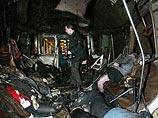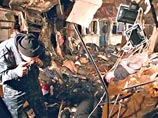Investigators expose names of terrorists who attacked Moscow metro
Specialists performed a molecular and genetic expertise to check the information and identify the persons
Moscow law-enforcement agencies exposed the information about suspects, who possibly performed an act of terrorism in the Moscow metro, having exploded a train car. A terrorist blew up the train car in the tunnel, when the train was moving from one station to another. Forty people were killed in the explosion, over 100 were injured.
You can view pictures of the terrorist act here (click on the photo to view the next one). 
The Moscow Prosecutor Anatoly Zuev told the Rossiiskaya Gazeta that the prime suspect in the attack was a man named Izhaev Anzor Azret, born in 1983, a national of the Karachaevo-Cherkessia republic. Specialists, the prosecutor said, performed a molecular and genetic expertise to check the information and identify the person.
It became known as a result of a rather complicated analysis that the body fragments found on the site (five of them were found) could belong to Izhaev. Experts are 99.9 percent sure. They took blood samples from the mother of the supposed suicide terrorist. “Our specialists left for Karachaevo-Cherkessia and asked questions to his mother, relatives and friends,” the prosecutor said.
 Investigators determined that Izhaev set off for Moscow from the republic on January 30th. It also became known that Izhaev was brought to criminal responsibility and put on wanted list in North Caucasus.
Investigators determined that Izhaev set off for Moscow from the republic on January 30th. It also became known that Izhaev was brought to criminal responsibility and put on wanted list in North Caucasus.
Alexander Zuev also reminded that the Office of the Public Prosecutor instituted criminal proceedings on the fact of the terrorist act performed in the center of Moscow, near National Hotel. Specialists carried out a very extensive and detailed work to identify the suicide terrorist. According to results of the expertise, the name of the female terrorist probably was Khediji Mangerieva, born in 1979. The woman came from the settlement of Kurchaloy, Chechnya. FSB specialists left for the republic and interrogated the woman's parents, who recognized their daughter on the photograph of her severed head. Specialists are still working on the molecular expertise. The analysis of the woman's shoes, found at the site of the crime, showed that the shoes had been worn in the region of North Caucasus, in eastern districts of Chechnya in particular.
The Moscow Prosecutor Anatoly Zuev also informed about the investigation of one of the recent terrorist acts, near the Rizhskaya metro station in Moscow. It was reported during the first days after the blast that a man named Nikolay Samygin was taken to Sklifosofsky's Institute, but subsequently died several hours after his hospitalization. No one called the Institute to ask for the man's body. Specialists decided to perform a fingerprint expertise, a dactylogram. The prosecutor believes that it is now possible to say that Nikolay Samygin was an accomplice of the suicide terrorist, who killed herself with a bomb near the metro station. The man's real name was Nikolay Kipkeev, born in 1967. Investigators found out that the man had two convictions and was on wanted list for his participation in illegal armed groups. Investigators believe that Kipkeev was incidentally killed in the attack.
Suicide terrorist attacks Moscow metro: photo gallery
According to the Moscow prosecutor, special services, law-enforcement bodies and other agencies should coordinate their efforts to protect Moscow from terrorists. “We discussed the issue with the presidential envoy in the Central administrative district, Georgy Poltavchenko, and Moscow Mayor, Yury Luzhkov. I suggested the establishment of a special department to counteract terrorism and extremism,” Zuev said.
The prosecutor believes, the department could be used for collecting and analyzing all kinds of information on the matter – terrorist acts of past, present and future, sources of finances, weapons and explosives, training camps, etc. “My principal stance, the basis of the anti-terrorist struggle, is prevention. Terrorists are very attracted to enterprises of dangerous production, the metro, sports arenas, large stores, market places, educational and healthcare institutions” Alexander Zuev said. “We realize that our prime goal is to create the conditions, which would exclude the possibility for terrorists to find shelter in Moscow. It implies the struggle against the power abuse and criminal negligence in passport, visa and other registration offices of Russia,” Alexander Zuev said.
According to the prosecutor, the terrorists, who seized hundreds hostage in the Moscow music theatre in 2002, obtained their Moscow registrations via a Moscow-based passport registration agency. Now, the prosecutor believes, terrorists do not venture to continue such practice. Nikolay Kipkeev, the suicide terrorist's accomplice, was registered in the Moscow region. Investigators determined, 300 other people were registered on the same address with Kipkeev.
Subscribe to Pravda.Ru Telegram channel, Facebook, RSS!




